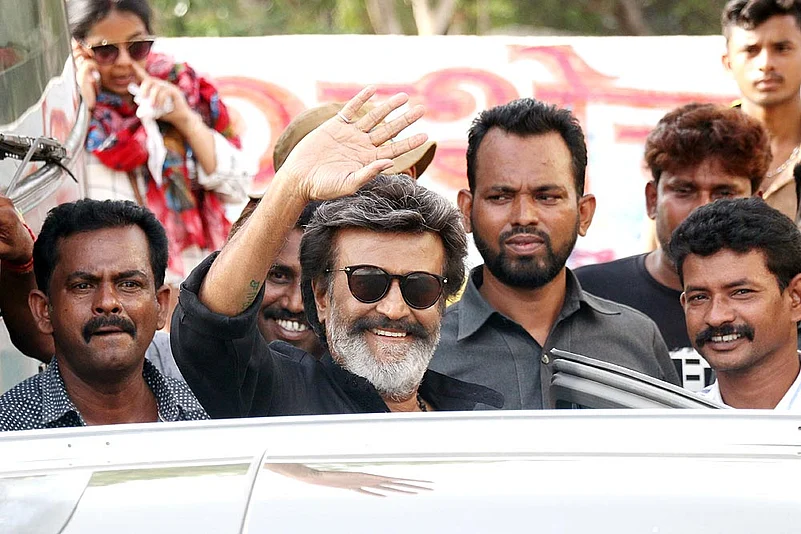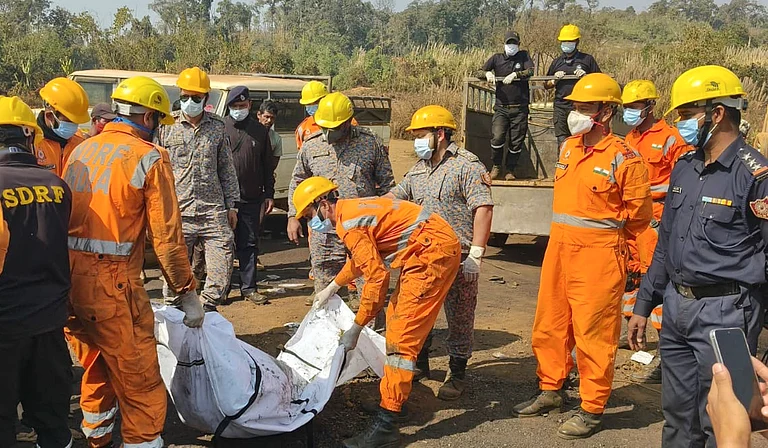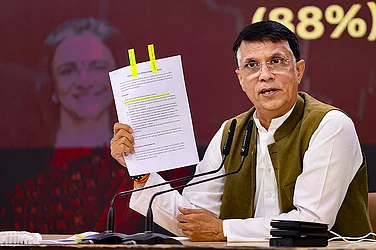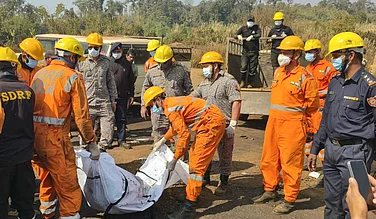“En vazhi, thani vazhi” (My path is a path apart)—that famous punchline from superstar Rajinikanth’s hit movie Padayappa—is all set to come true. Finally, after decades of dithering, Tamil cinema’s superstar seems close to taking the political plunge. And, as promised, he would be charting his own path by launching a new party.
During a meeting with his fans recently, when he took photographs with them, Rajinikanth vaguely outlined his political intent. “If god so wills it, I will enter politics. And those who want to make money from politics will be kept away,” were his opening remarks. In his concluding remarks, he asked his fans to get back to their work and report when the “war” is announced (comparing elections with war). Having raised their expectations sky high, the 67-year-old Rajinikanth cannot afford to retreat like he has done in the past—and his supporters assert that he won’t. “Once the movie assignments are wrapped up by October, Rajinikanth will make the announcement,” reveals a close confidant. “The new party and its agenda would be in place for the 2019 general elections. The groundwork has already commenced, with a few advisors already drawing up the blueprint. Rajinikanth wants to dominate the next phase of Tamil Nadu politics and he will.”
So what has changed on the political horizon that makes Rajinikanth’s entry more conducive and electorally viable now? Political observors say it is the absence of J. Jayalalitha and M. Karunanidhi from the scene. The fading away of the state’s dominant duo has created a vacuum and has thrown its polity into a flux. The AIADMK looks rudderless despite holding on to power. It has lost its name and symbol—and, thereby, its electoral efficacy. The party has conveniently placed itself as a captive in the BJP’s hands—an arrangement that protects it from attempts to destabilise it and also ensures the flow of central funds.
On the other hand, M.K. Stalin is piloting the DMK, which has not really gained from the disquiet in its arch rivals’ ranks. The national parties have not shown signs of revival; Modi magic is yet to percolate in the filter coffee state, while the Congress is too dependent on the DMK. Smaller parties such as the Pattali Makkal Katchi (PMK) led by Anbumani Ramadoss, film star Vijayakanth’s Desiya Murpokku Dravida Kazhagam (DMDK) and Vaiko’s Marumalarchi Dravida Munnetra Kazhagam (MDMK) are fast receding into irrelevance. That leaves only the fringe players to make their noisy presence felt, at least on TV channels, only to disappear from the ballot paper. The script seems readymade for Rajinkanth’s entry.
“Rajini could be the alternative to the DMK and the AIADMK that Vijayakanth failed to be,” says R. Manoharan, an auto-driver and AIADMK supporter since its formation in 1972 when MGR broke away from the DMK. “He will be the first choice of those looking for that elusive third player. For the AIADMK’s confused cadres, torn between EPS (CM E.K. Palaniswami) and OPS (former CM O. Panneerselvam), Rajinikanth could be a safer and winning bet.”
Uday Shankar, a typical upper-middle-class manager living in Ashok Nagar, Chennai, echoes the auto-driver’s sentiment. “Rajinikanth will get all the four votes in our house, only because we want to give him a chance as the others have failed to live up to our expectations,” he says. “We expect him to keep his word on not encouraging corruption.”
The state’s politics, moreover, has been personality-driven since the MGR days. “Karunanidhi underestimated the power of MGR’s star value and paid a political price for expelling him from the DMK,” says former Chennai mayor Sadai S. Duraiswamy. “Rajinikanth’s reach is also being misjudged by the state’s leaders.”
It is the sheer magic of Rajinikanth’s stardom that could translate into votes. His promise of a new beginning could sweep not just the uncommitted voters, but also those committed to others. No wonder every other political player is wary of the “Rajini effect”. Stalin was hoping Jayalalitha’s exit had left the field open for him, but now he has to stand up to Rajinikanth’s challenge.
Even a party like the Viduthalai Chiruthaigal Katchi (VCK), with a committed Dalit base, is unsure how to weather Rajinikanth’s coming. “Dalits are most vulnerable to the personality cult,” says VCK general secretary D. Ravikumar. “They supported MGR, Jayalalitha and Vijayakanth. And they will support Rajinikanth too. Unless we make them politically aware of their rights, the opium of hero-worship would influence them.”
Ramadoss has questioned the need for another actor-politician, saying the state has had enough of them. “The PMK is vehemently opposed to cinema-based politics as it cuts through even caste consolidation,” says a former PMK MP. “For example Vijayakanth has hurt us badly since his arrival in 2005 as his fan base and our caste base overlapped. The Vanniyar youth who used to vote for us went to him. Rajinikanth’s impact would be more devastating.”
Other fringe players led by director Seeman, whose Naam Thamizhar Katchi lost deposits in all 234 seats it contested in 2016, have raised the Tamil flag to stop Rajinikanth. “We have had enough of non-Tamils (MGR, a Malayalee, and Jayalalitha, a Kannadiga) ruling this state. Let Tamil Nadu be ruled only by Tamils,” says Seeman. But Rajinikanth—a Marathi formerly known as Shivaji Rao Gaekwad—has already laid out his defence. “I lived in Karnataka for 24 years and for the remaining 43 years I have been in Tamil Nadu. The Tamils made me what I am today. That makes me a ‘pacchai Thamizhan’ (true blue Tamil),” he declared amid cheers from his fans.
“Every political leader worried about Rajinkanth spiriting away his followers would play the Tamil card. He would have to confront it every day until he gets the ultimate acceptance—an election victory,” points out a senior police officer. But Rajinikanth’s advisors are confident that once he declares that his political entry is meant to repay his debt of love he got from the Tamils, such protests would evaporate.
The BJP has said it is eager to welcome him into its fold, but Rajinikanth had long ago made his mind known to his political guru Cho Ramaswamy: “If I enter politics, I would be the striker on the carrom board and not another coin.” This approach would free him from the BJP’s internal compulsions and let him talk about seat-sharing as an equal.
By all indications, Rajini may be ready for an alliance with the BJP—mostly out of regard for PM Narendra Modi, whom he describes as India’s Lee Kuan Yew. “Sailing with the BJP would gain him immediate national intention, offer protection from his adversaries and generate the kind of political buzz not seen in Tamil Nadu for a long time,” says a Congress veteran. “Just imagine the sight of Modi and Rajini addressing a political meeting. It would be a replay of DMK founder Annadurai and MGR sharing the stage. The crowds will go crazy.”
***
The Star’s Past Political Forays
- 1996 “Even god cannot save Tamil Nadu if Jayalalitha returns to power,” said Rajinikanth, who supported the DMK-TMC alliance.
Impact Jayalalitha was routed. - 1998 “The Coimbatore serial blasts are a conspiracy to spoil the victory chances of the DMK-TMC in the Lok Sabha election.”
Impact The AIADMK-led alliance won most of the seats. - 2004 “My cadres will work for the defeat of PMK candidates and campaign against DMK-Congress.”
Impact The DMK-Congress-PMK front swept the elections, winning all the 39 LS seats.
By G.C. Shekhar in Chennai


























